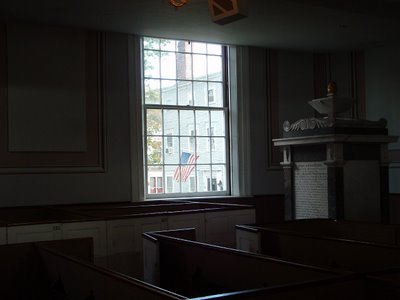
"Church and State"
My wife, Cindy, took this photograph from the inside of a colonial era Presbyterian Church in New England
(Click on the photo to enlarge)
Elias Boudinot is an unfamiliar figure to most Americans. Born in Philadelphia in 1740, Boudinot served as a delegate from New Jersey to the Continental Congress from 1777 to 1778 and again from 1781 to 1784. In 1783, as president of the Continental Congress, he signed the Treaty of Paris and was for a time President of the United States in Congress Assembled. After the Constitution was ratified, he served as a U.S. Representative from 1789 to 1795. He was later appointed Director of the United States Mint. He was also a committed Presbyterian. In an address to the Oration Society of Cincinnati on July 4, 1793 Boudinot said,
“The late revolution, my respected audience, in which we this day rejoice, is big with events, that are daily unfolding themselves, and pressing in thick succession, to the astonishment of a wondering world. It has been marked with the certain characteristics of a Divine over-ruling hand, in that it was brought and perfected against all human reasoning, and apparently against all human hope. . . . Divine Providence, throughout the government of his world, appears to have impressed many great events with the undoubted evidence of his own almighty arm. He putteth down kingdoms, and He setteth up whom he pleaseth, and it has been literally verified in us, that ‘no king prevaileth by the power of his own strength’” (The Founders on Religion, edited and introduced by James H. Hutson).




No comments:
Post a Comment